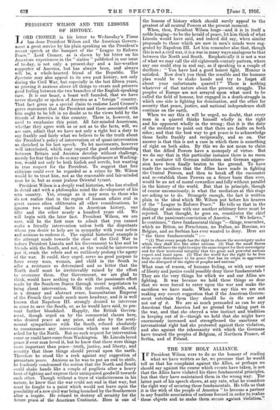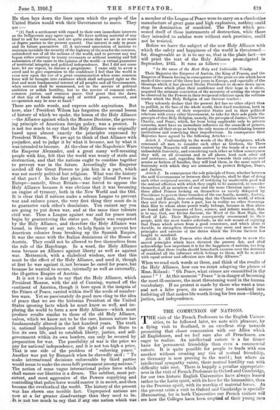THE NEW HOLY ALLIANCE.
IF President Wilson were to do us the honour of reading what we have written so far, we presume that he would tell us that his complaint against the Allies, or perhaps we should say against the course which events have taken, is not that the Allies have violated his three fundamental principles, but that they have maintained them in the wrong way. The latter part of his speech shows, at any rate, what he considers the right way of securing these fundamentals. He tells us that it is the wish of the people of America "to become a partner in any feasible association of nations formed in order to realize these objects and- to -make them secure against violation.". He then lays down the lines upon which the people of the United States would wish their Government to move. They are :- " (1) Such a settlement with regard to their own immediate interests as the belligerents may agree upon. We have nothing material of any kind to ask for ourselves, and are quite aware that we are in no sense or degree parties to the present quarrel. Our interest is only in peace and its future guarantees. (2) A universal association of nations to maintain inviolate the security of the highway of the seas for the common, unhindered use of all the nations of the world, and to prevent any war begun either contrary to treaty covenants or without warning and full submission of the cause to the opinion of the world—a virtual guarantee of territorial integrity and political independence. But I did not come here, let me repeat, to discuss a programme. I came only to avow a creed and to give expression to the confidence I feel that the world is even now upon the eve of a great consummation when some common force will be brought into existence which shall safeguard right as the first and most fundamental interest of all peoples and all Governments, when coercion shall be summoned, not to the service of political ambition or selfish hostility, but to the service of common order, common justice, and common peace. God grant that the dawn of that day of frank dealing and of settled peace, concord, and co-operation may be near at hand."
These are noble words, and express noble aspirations. But here, alas ! President Wilson has forgotten the second lesson of history of which we spoke, the lesson of the Holy Alliance —the Alliance against which the Monroe Doctrine, the govern- ing principle of American foreign policy, was a protest. It is not too much to say that the Holy Alliance was originally based upon almost exactly the principles expressed by President Wilson. We are apt to think of that Alliance with prejudice, and to judge it by what it became, not by what it was intended to become. At the close of the Napoleonic Wars the Emperor Alexander, and a great many well-meaning people with him, felt that the world was weary of strife and destruction, and that the nations ought to combine together to prevent war in the future. Accordingly the Emperor invited all the Great Powers to join him in a pact, which was not merely political but religious. What was the history of that pact ? In the first place, the only liberal Power in Europe—namely, Great Britain—was forced to oppose the Holy Alliance because it was obvious that it was becoming an engine of tyranny, both in the New World and the Old. It is clear that if nations make a solemn League to prevent war and enforce peace, the very first thing they must do is to guarantee each other's dominions. You cannot say you are going to put down war, and at the same time tolerate civil war. Thus a League against war and for peace must begin by guaranteeing the status quo. Spain was supported by the Holy Alliance, and therefore the Holy Alliance was bound, in theory at any rate, to help Spain to prevent her American colonies from breaking up the Spanish Empire. It was the same with the Italian dominions of the House of Austria. They could not be allowed to free themselves from the rule of the Hapsburgs. In a word, the Holy Affiance soon became an Alliance against liberty as well as against war. Metternich, with a diabolical wisdom, saw that this must be the effect of the Holy Alliance, and used it, though at first he was against it, not because he cared for peace, but • because he wanted to secure, internally as well as externally, the ill-gotten Empire of Austria. It is not to much to say that the Holy Alliance, which President Monroe, with the aid of Canning, warned off the continent of America, though it bore upon it the insignia of the Prince of Peace, carried within itself the seeds of number- less wars. Yet so passionately do good men cling to the idea of peace that we see the historian President of the United States ignoring facts which he must know so well, and im- ploring the world to form a new Holy Alliance—which must • produce results similar to those of the old Holy Alliance, unless, which we know not to be the case, human nature has fundamentally altered in the last hundred years. The truth is, national independence and the right of each State to live its own life, and to establish liberty, justice, and self- government within its own borders, can only be secured by preparation for war. The possibility of war is the price we pay for national independence, and it is not too high a price. That is one side of the problem of " enforcing peace." Another was put by Bismarck when he shrewdly said : " To make international decisions enforceable by third parties would mean to make the ensue belli permanent among nations." The notion of some vague international police force which shall ensure our liberties is a dream. The subtlest, most per- sistent, and most aggressive of the Powers supplying and controlling that police force would master it in secret, and then become the overlords of the world. The history of the present war has shown one terrible fact. Unprepared nations are now at a far greater disadvantage than they used to be. . h is not too much to say that if any one nation which was a member of the League of Peace were to carry on a clandestine manufacture of great guns and high explosives, nothing could stop its domination of mankind. The Power which pos- sessed itself of these instruments of destruction, while those they intended to subdue were without such provision, could not be resisted.
Before we leave the subject of the new Holy Alliance with which the safety and happiness of the world is threatened— for, disagreeable as it is to say so, that is the plain fact—we will print the text of the Holy Alliance promulgated in September, 1815. It runs as follows :— " In the name of the Most Holy and Indivisible Trinity.
Their Majesties the Emperor of Austria, the King of Prussia, and the Emperor of Russia having in consequence of the great events which have marked the course of the three last years in Europe, and especially of the blessings which it has pleased Divine Providence to shower down upon those States which place their confidence and their hope in it alone, acquired the intimate conviction of the necessity of settling the steps to be observed by the Powers in their reciprocal relations upon the sublime truths which the Holy Religion of our Saviour teaches :
They solemnly declare that the present Act has no other object than to publish, in the face of the whole world, their fixed resolution, both is the administration of their respective States and in their political relations with every other Government, to take for their sole guide the precepts of that Holy Religion, namely, the precepts of Justice, Christian Charity, and Peace, which, far from being applicable only to private concerns, must have an immediate influence on the councils of princes, and guide all their steps as being the only means of consolidating human institutions and remedying their imperfections. In consequence their Majesties have agreed to the following Articles :-
Article 2. Conformably to the words of the Holy Scriptures, which command all men to consider each other as brethren, the Three Contracting Monarchs will remain united by the bonds of a true and indissoluble fraternity, and considering each other as fellow countrymen they will, on all occasions and in all places, lend each other aid and assistance, and, regarding themselves towards their subjects and armies as fathers of families, they will lead them, in the same spirit of fraternity with which they are animated, to protect Religion, Peace, and Justice.
Article 2. In consequence the sole principle of force, whether between the said Governments or between their Subjects, shall be that of doing each other reciprocal service, and of testifying by unalterable good wilt the mutual affection with which they ought to be animated, to consider themselves all as members of one and the same Christian nation : the three allied Princes looking on themselves as merely delegated by Providence to govern three branches of the one family, namely, Austria, Prussia, and Russia, thus confessing that the Christian world, of which they and their people form a part, has in reality no other Sovereign than Him to whom alone power really belongs, because in Him alone are found all the treasures of love, science, and infinite wisdom, that is to say, God, our Divine Saviour, the Word of tho Most High, the Word of Life. Their Majesties consequently recommend to their people, with the most tender solicitude, as the sole means of enjoying that Peace which arises from a good conscience, and which alone is durable, to strengthen themselves every day more and more in the principles and exercise of the duties which the Divine Saviour has taught to mankind.
Article 3. All the Powers who shall choose solemnly to avow tha sacred principles which have dictated the present Act, and shalt acknowledge how important it is for the happiness of nations, too long agitated, that these truths should henceforth exercise over the destinies of mankind all the influence which belongs to them, will be re_eivecl with equal ardour and affection into this Holy Alliance."
When we read such words as these, and think of the results of the Holy Alliance, how can we resist adapting the phrase of Mme. Roland : " Oh Peace, what crimes are committed in thy name ! " ? At this moment " Peace " is in danger of becoming the most ill-ominous, the most threatening word in the human vocabulary. If no protest is made by those who want a true and not a false peace, its misuse may lure mankind into forfeiting all that makes life worth living for free men—liberty, justice, and independence.



































 Previous page
Previous page